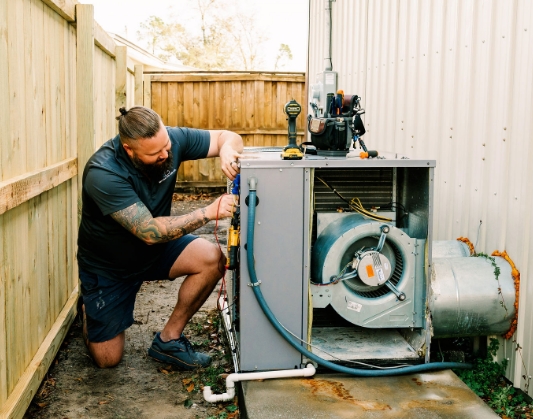HVAC Maintenance – Panama City, FL
Happy HVAC System, Happy Home
Like countless other machines, such as a car, your HVAC system will only continue to work as long as it is in good condition and is properly maintained. Just as failing to change the oil in your car routinely could result in disaster on the road, neglecting your home’s heating and cooling system will inevitably lead to a temperature disaster at home. In other words, your HVAC system needs little tune-ups too! Fortunately, we offer a yearly plan here at A&H Heating and Air LLC that enables you to receive HVAC maintenance in Panama City affordably.
Why Should My HVAC System Be Maintained Regularly?

Unfortunately, HVAC system failure often happens at the most inconvenient times. Your air conditioning can suddenly stop working during the hottest part of summer, or your heater can fail during a deep freeze in wintertime. In these situations, everyone’s safety becomes a genuine concern, and it can turn into a desperate scenario.
However, scheduling maintenance can make sure your system is ready to handle whatever comes your way in a safe, temperature-controlled home. In addition, keeping your HVAC system in optimal condition can extend its lifespan and make sure it’s running as efficiently as possible, saving you money through the following:
- Lower energy bills from greater efficiency.
- Avoiding unnecessary repairs (i.e., lower long-term costs).
- Maintaining your warranty on the HVAC system.
The Process of HVAC Maintenance

When we perform a maintenance check, we do the following:
- Look for refrigerant leaks and make sure levels are normal
- Clean and straighten condenser coils for proper air flow
- Tighten all electrical connections
- Check for leaks in the gas connections and ductwork
- Test the thermostat to make sure it’s turning the system on and off properly
- Apply lubrication for all moving parts
- Check air filter
HVAC Maintenance FAQs
How Often Do Air Filters Need to Be Replaced?
This will be different depending on the kind of air filter that you’re using. If you have a lower-cost disposable filter, then we’ll likely suggest that you replace them every 30 days. With poly or pleated filters, it’s typically recommended to change them out after 90 days instead. There are also media filters or CleanEffects filters, which can generally last somewhat longer than other types, and they will only need to be replaced at least once a year.
How Often Should I Service My Air Conditioning Unit?
It’s usually recommended that people have their air conditioning unit serviced at least once every year. In many cases, this can save you on both energy and repair costs, allowing your system to run more smoothly and efficiently as well as making it last much longer. The longer you wait to get your air conditioner serviced, the worse it can perform and the higher the chance of it breaking down or wearing out. If you’re trying to save by postponing maintenance, doing so can backfire on you and you can end up having to pay a higher cost on energy bills and/or repairs, especially if a serious problem occurs with your unit.
Do Bigger Air Conditioning Units Work Better?
With air conditioning systems, bigger isn’t necessarily better. Firstly, you’ll want to have an AC unit that’s the ideal size for your home. Buying one that is too big can end up cooling your house quicker, but it’ll be less efficient and won’t get rid of humidity as effectively. A larger system will also run short cycles, meaning it might shut off before it can blow sufficient air across the indoor coil that drains water from your unit. By leaving too much moisture in your home’s air, you might eventually expect to see mold and mildew in your living space. That’s why, with your professional contractor’s help, you’ll want to invest in an air conditioner that’s just the perfect size for your home.
How Long Does HVAC Equipment Last?
For the most part, the majority of HVAC systems usually last around 10 to 15 years before needing a replacement. That said, it’s important to remember that your unit typically becomes less effective and may perform worse the older it gets. For this reason, it’s a good idea to consider getting it replaced after around 10 years, even if you aren’t noticing or experiencing any major issues in your home. More modern HVAC systems will generally help you save more on energy bills since they’re built more efficiently. Additionally, these units often come with 10-year warranties, meaning you won’t have to stress about getting them replaced for some time!
